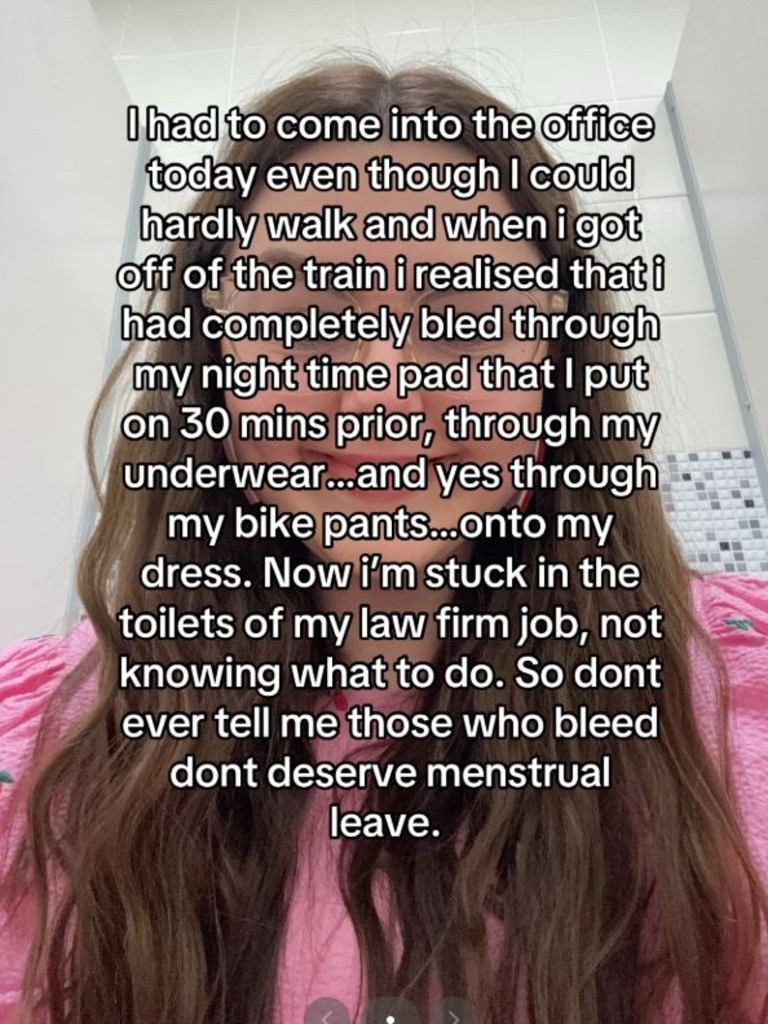‘Mortifying’: Moment 27yo knew she needed to leave work
A young woman has revealed the “mortifying” reason she had to leave work and why it exposes a workplace need that has yet to be met.
At Work
Don't miss out on the headlines from At Work. Followed categories will be added to My News.
A young Aussie has gone viral for sharing when she was stuck in the bathroom at work because she bled through her dress.
Chantel Billy shared on social media a situation she experienced where she had bled through her pad during her commute to work.
“Don’t ever tell me those who bleed don’t deserve menstrual leave,” she said.
The 27-year-old said that she was hiding in the bathroom of her corporate job and “didn’t know what to do”, calling it one of her worst moments of 2024.
“The experience was mortifying. I knew I’d have to go home and I felt incredibly guilty about it,” she told news.com.au.
MORE: 5 signs your workplace is toxic – and what to do about it
Ms Billy explained that, even though she knew she had a genuine reason to leave work, there’s still so much stigma around periods that she has to consciously work in order to overcome it.
“There’s a sense of ‘oh, it is just a period, deal with it’. Even though if someone cut their hand or had a headache, they would be able to go home with no questions asked,” she said.
Some of her reluctance to leave work stemmed from past experiences where her period pain or problems have been dismissed.
“I’d still say it’s quite taboo,” she said.
“I’d never discuss it with a male boss or colleague. Regarding the situation last week, my female manager was incredibly understanding and helpful and encouraged me to go home if I felt I needed to.
“However, I know in the past that I have had bosses who wouldn’t offer the same or would be clearly annoyed at me for having to go home.”


MORE: Is a toxic workplace warping your sense of what’s normal?
Ms Billy experiences severe period symptoms. She’s usually unwell from her period for between one or two weeks of the month.
“This can range from severe cramping, impacted sleep, hot and cold flushes, loss of appetite, decline in mental health and being light headed,” she said.
“I’m lucky that I get to work from home a lot of the time, and therefore I can manage symptoms easier. If I had to work in an office full time, I’d need to take 1-2 days off per month as some days I cannot physically make it out of my house.”


Ms Billy said she believes period leave needs to exist because so many women suffer from period-related diseases like endometriosis and polycystic ovary syndrome.
Conditions that make periods unbearably painful. In Ms Billy’s case, she’s never been officially diagnosed.
That is because she feels like when she has tried to seek medical help, she wasn’t taken “seriously” and was just told to lose weight or go on the pill.
“Period leave or maybe simply additional sick leave would allow women to manage their symptoms, seek treatment and not have to use all of their regular sick leave,” she said.
Australia is also behind.
In 2023, Spain introduced “menstrual leave” from work. Workers in Spain with painful periods are entitled to three to five days of paid period leave each month.
There are a handful of organisations in Australia that have introduced paid period leave, but it is nowhere near the norm.
Ms Billy said she knows that one reason businesses are reluctant to introduce period leave is that people claim it is “unfair for men” or that full-time workers are already entitled to 10 days paid sick leave a year.
“I feel like some sort of additional leave entitlement should be offered or at the absolute minimum, flexibility to work from home or half days,” she said.
“Businesses need to come to a middle ground and not simply shut down the idea because it’s too difficult to figure out the logistics of how the leave would be monitored and offered.”

Mary Crooks, the executive director at Victorian Woman’s Trust, a gender equality agency, said that period leave is important for “critical reasons” that workplaces shouldn’t ignore.
“While menstruation is a process of the utmost physiological integrity, it can, however, create real discomfort, which can hamper one’s work and day-to-day living,” she told news.com.au.
“Periods have also come in for a bad wrap across centuries. A menstrual taboo shrouds periods in secrecy and negativity and works against women taking care of themselves as well.”
The company began offering its menstrual and menopause wellbeing policy in 2017, giving staff 12 days a year of paid leave for this purpose.
Ms Crooks said that period leave would lead to more “openness and responsiveness” to periods.
“It has the potential to slowly but surely create a more positive menstrual culture across our society,” she said.
“Period leave is likely to be cost-effective too – as employers find ways of retaining good staff versus the costs of staff turnover.”
Originally published as ‘Mortifying’: Moment 27yo knew she needed to leave work









